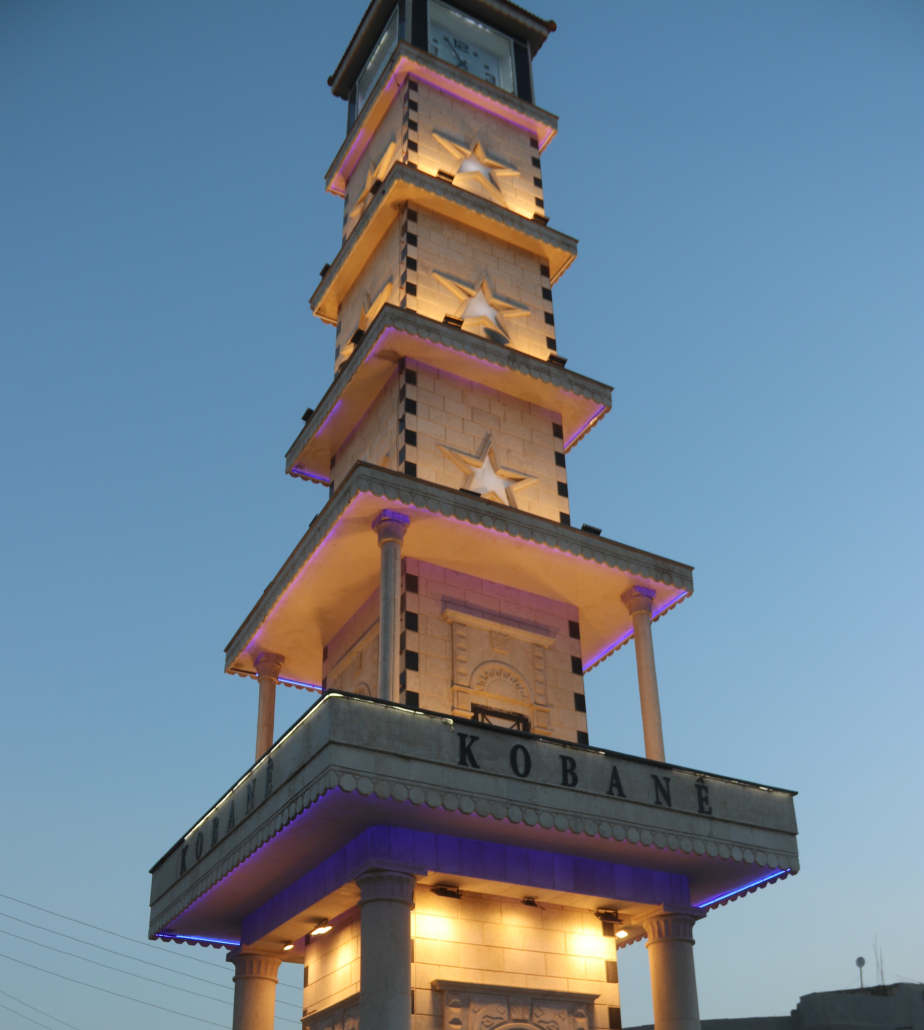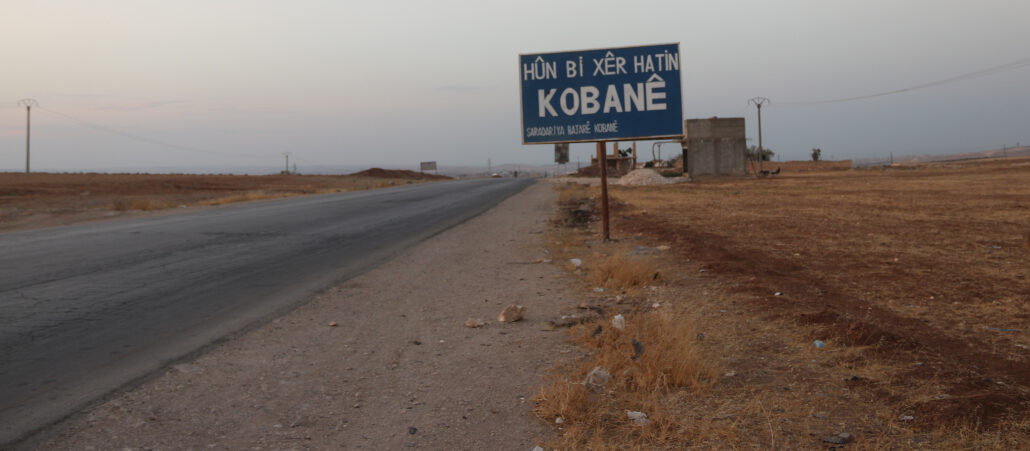In December 2023, the Democratic Autonomous Administration of North and East Syria (DAANES) approved and published its much-anticipated updated Social Contract, based on “democratic, environmental, societal and women’s freedom”. Amongst the reforms included was a re-structuring of the municipal and council system, as well as a stated plan to hold elections at various administrative levels. Since the publication of the new Social Contract, North and East Syria (NES) has witnessed two intense rounds of Turkish airstrikes, targeting electricity, gas and oil stations as well as civilian workplaces and infrastructure. In Kobane city, RIC spoke with Ferhan Haji Issa, co-chair of the Executive Council of the Euphrates Canton, Rewshan Abdi, co-chair of Kobane Municipality, and Mohamed Hamdan al-Mohamed, co-chair of the People’s Council of the Euphrates Canton, regarding the current situation in Kobane, the system changes contained in the new Social Contract and the upcoming municipal elections.
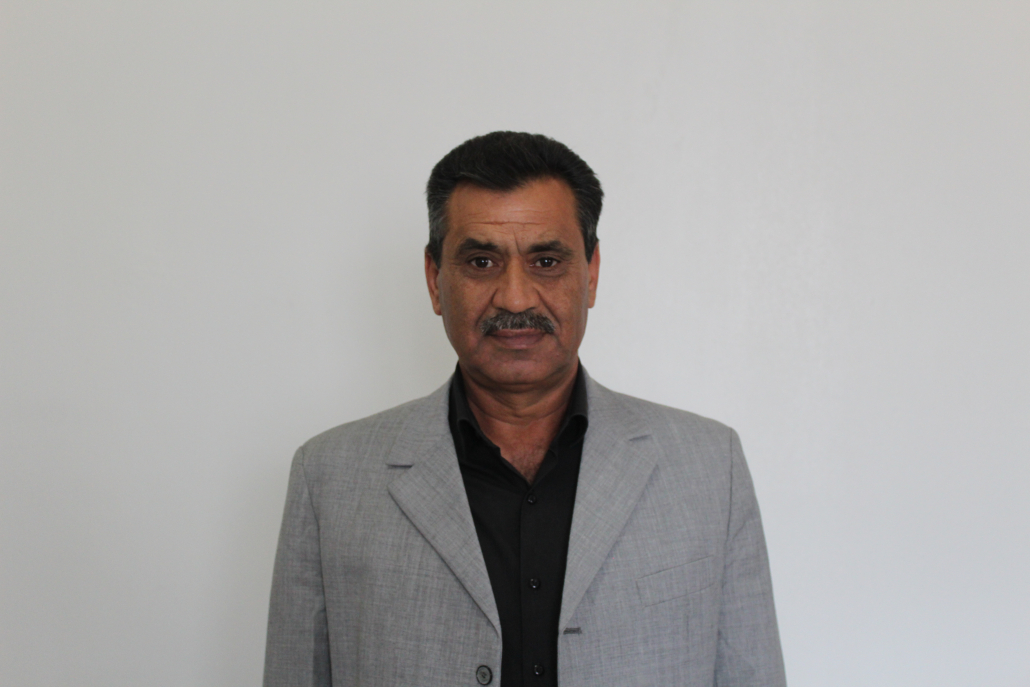
How is the work of the Executive Council going currently?
Ferhan Haji Issa: We – as the whole of NES and the whole of Syria too – are within a crisis right now. We are suffering. If we consider the situation here, we have to examine all the problems Syria is facing. The [Syrian] regime has not democratized Syria – there are no true parliamentary elections for example – but neither has there been a real revolution from the Syrian Opposition. Sadly, the people’s uprisings did not reach this kind of outcome. Historically, what we have had inside Syria has been coups. Militias fighting other militias. In 1946, Syria was liberated from France. In 1949 there was a coup. In 1961 there was a coup. 1963 too. 1966, 1970. The situation of Syria has been like this. Syria is in a massive crisis. In NES, we are presenting and following a new project, diverging completely from the oppressive mentalities that have been imposed on Syria. For this reason, there is a lot of animosity towards this project. Many states are antagonistic towards us. The Syrian state, the Russian state, the Iranian state. The Turkish state has taken ensuring the failure of this project as a duty upon itself. Our aim is for society to be able to govern itself, represent itself and have its own will. At the same time, a lot of pressure is put on our region, and particularly on the Euphrates canton. It is right on the border. To the east of us is the Turkish state, to the north is the Turkish state, to the west is the Turkish state and its Syrian National Army mercenaries. The Euphrates Canton experiences a lot of difficulties – particularly Kobane. Kobane is an example of resistance against terror. For this reason, Turkey targets Kobane and, through this, the whole of NES. Hence, our first priority is to defend ourselves. And then, at the same time, to govern ourselves. We have economical problems. We are under huge pressure due to the embargo on us. Our service institutions and essential infrastructure are attacked. We have a crisis of foreign relations. I will speak frankly to you: the people of NES live under a siege. So, how can we defend ourselves, solve our economic, social and many other problems, build our councils and Autonomous Administration with the means available to us? We will be open with our people and solve the issues that we can together. We don’t conceal things from our people. I see our work in this framework. We will address problems, defend ourselves and then in the future enhance social services. We are like a frontline against injustice. As individuals, we have a historical, human and ethical duty on our shoulders to do our job as civilian administrators, just like those who take the burden of militarily protecting our region.
What concrete projects are you working on right now?
Ferhan Haji Issa: In this year, 2024, we have a massive financial crisis. We are taking an “essentials only” approach. Some of our key objectives are: health, water, bread. These are the things most needed for people to live. Right now we have a project to build a health clinic. Assisting clinics with medicines is a primary aim for us, however few our resources are, because it is so important for people’s living situation. We have no medicine production facilities here. Medicine is brought from outside the region. There is also the issue of Leishmaniasis in the Euphrates Canton due to the Euphrates River water. Health points are being set up to deal with this. We have electricity problems, so we are doing things to address this. We have the hydroelectric dams on the Euphrates River, but Turkey doesn’t let a lot of water enter Syria. We need alternative electricity sources and are preparing projects in this line, but this year we are really constrained economically. Just to make it clear: the Turkish state has targeted our service institutions and essential infrastructure. The harm done to our society and infrastructure is such that it will take at least 10 years to recover. But we are insistent and determined. We will be able to do this. We have agricultural projects to enable us to plant more. We are an agricultural region, so we need this.
What is the role of the municipality? How is this changing with the new Social Contract?
Rewshan Abdi: As per the old Social Contract, the municipality is connected both to the District Council, and to the Municipalities Board within each Canton Council. This meant double the number of monthly meetings and reports, because the connection was two-sided. With the new Social Contract, it will become one because the Municipalities Board will be abolished, and the municipalities will have autonomy from the District Councils. The Municipalities Union will be built instead. The people will elect their municipality co-chairs and the elected co-chairs of the municipalities will all be members of the Union, and will elect the two co-chairs of the Union from amongst themselves. So we, as the municipality, will continue to work with the councils and communes, but we will be independent. Every month, we meet with all the communes. Even though the municipality is not strictly connected to the communes, we coordinate with one another. The communes themselves remain directly linked with the District Council. These changes are still being worked out and remain on paper, having not yet been implemented on the ground.
As per the old Social Contract, the Canton Council had a supervision committee for the municipality, to follow how the work is going. But sometimes, this committee would put itself in the place of the municipality, doing others’ work rather than its own. Problems emerged from this. So this issue should be removed with the changing of the system under the new Social Contract, as there will be more independence for the municipality. This extends up to finance too. Previously, the municipality had to go through the Municipalities Board and it was a long process. Hopefully it will now be able to go smoother, with less bureaucracy and interference from the District Council and Canton Council.
Additionally, with the new Social Contract, the remit of the municipalities has expanded, to include some tasks that were not previously connected to it. Up until now, the municipality has been focussed on service provision and infrastructure maintenance. We have not been able to fulfil more social tasks, such as those linked to culture, relief aid, society and the poor. There are many things we want to do, but the issue is the lack of resources: money. We hope in the future to be able to help our people more, and move beyond just the level of basic services, such as roads and sewage. There has been progress in the work of the municipalities. In 2015, the city was in ruins and we were cleaning the rubble, rebuilding. It took one year to clean the city. We are now doing what we can with what we have. We need a bigger budget. The work can only be as good as the budget is. But we have been able to provide services and solve, let’s say, 70-80% of people’s problems in comparison to the situation before. There are some things still really needed, but now a lot of the infrastructure has been built. The people themselves rebuilt it. No one else did anything. There was no external assistance; not from Europe, not from the Coalition, not from anyone. There are some people who are still living in rented homes, because they couldn’t rebuild.
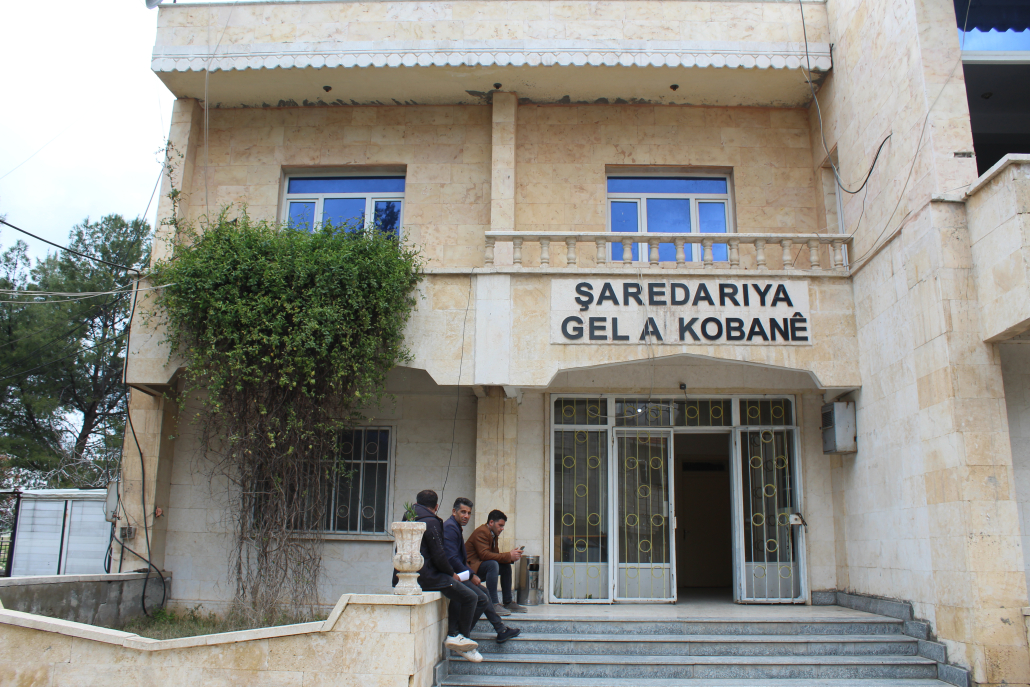
Economically, what was the impact of the recent rounds of Turkish airstrikes on your budget? Mazloum Abdi said that half the SDF budget was lost. On your end, what is the situation?
Ferhan Haji Issa: The DAANES’ Economy Board can give you the hard numbers. I can illuminate the current situation through examples. To rebuild just the Suwaydiyah station will requires $1 billion. For a region under embargo, a region that receives no external assistance, a region that is governing itself, $1 billion is a massive amount. Mazloum Abdi’s figure resonates with us. Our approach of “essentials only” means we can do half the things we want. With regards to expanding our projects, this is a constraint.
America’s Ceaser Sanctions were lifted for North and East Syria in 2022. Have you seen a positive economic impact from this?
Ferhan Haji Issa: No. It was a superficial change. Nothing actually improved. This was a decision from America. It was reported in the media. But America has not really fulfilled its role. If America properly wants to assist economically here, it should be coordinating with institutions here regarding finances, external relations and border crossings, but it has not done anything in this regard. This is because of Turkish pressure. Up until now, Yaroubiyah has not been able to be open as a formal border crossing. This region is under huge pressure. Okay, our situation in NES is actually better than in the other regions of Syria. We govern ourselves through the DAANES. But our border crossings are basically shut and no external assistance from the international community can enter. We have no help for our people. We are doing this ourselves. The lifting of the Caesar Sanctions was a symbol of support: something to be announced in the media but that did nothing on the ground. America is not playing any proper role inside NES.
And what about the other economic sanctions on Syria, that target Assad’s circle? How do they impact NES?
Ferhan Haji Issa: The sanctions on Syria have primarily hurt the people of Syria. The society itself was affected. Okay, some specific individuals – businessmen – were named for sanctions, but the regime has not really been hurt itself. The regime should be punished. The regime was involved in massacres in Syria. The Syrian people have paid the price since the Ba’ath regime took power. Sanctions should target the regime while, at the same time, protect society. These sanctions have hit the people more than the regime. Whatever happens in the regime areas affects us too. When the dollar rises in value against the Syrian pound, we also suffer from this. We use the Syrian currency. We don’t want to use other money. The DAANES is always facing accusations of separatism; that it wants to split from Syria and make its own state. We are trying to disprove these falsehoods.
How was the electricity situation in Kobane impacted by the recent Turkish attacks? It is clear that the electricity situation here is very different from, for example, Qamishlo. The Euphrates Canton has hydroelectric dams. In Qamishlo, there are diesel-run electricity generators.
Ferhan Haji Issa: Turkey targeted our service institutions and essential infrastructure, attacking our electricity transformers with airstrikes, destroying them. We carried on – what else can we do? We have 3 or 4 hours of electricity now, per day. In 2014, when ISIS attacked, so much of Kobane was totally ruined. Then, after ISIS was defeated, the Turkish state began targeting us. We liberated the Kobane area from ISIS – but Turkey took over its role of attacking us. At the same time, Turkey is taking a strategical approach. Turkey has control of the Euphrates River water entering our region. Kobane has been cut from electricity. 3, 4 hours per day is insufficient for meeting our people’s needs. We discuss this with the DAANES. We will find a way. Maybe we will bring electricity generators here. They are not what we want, but it is necessary. People can’t live without electricity. We also share electricity across cantons. Our needs are higher than in the other cantons. For example, in Qamishlo there was not this massive destruction from war like in Kobane. In Raqqa, even though the war there was really intense, the destruction of electricity infrastructure was actually overcome quite fast, as many international organizations lent a hand. Unfortunately, in Kobane it was not like this. We are discussing this issue a lot right now: both with our people and with the DAANES. We want to fix this urgently.
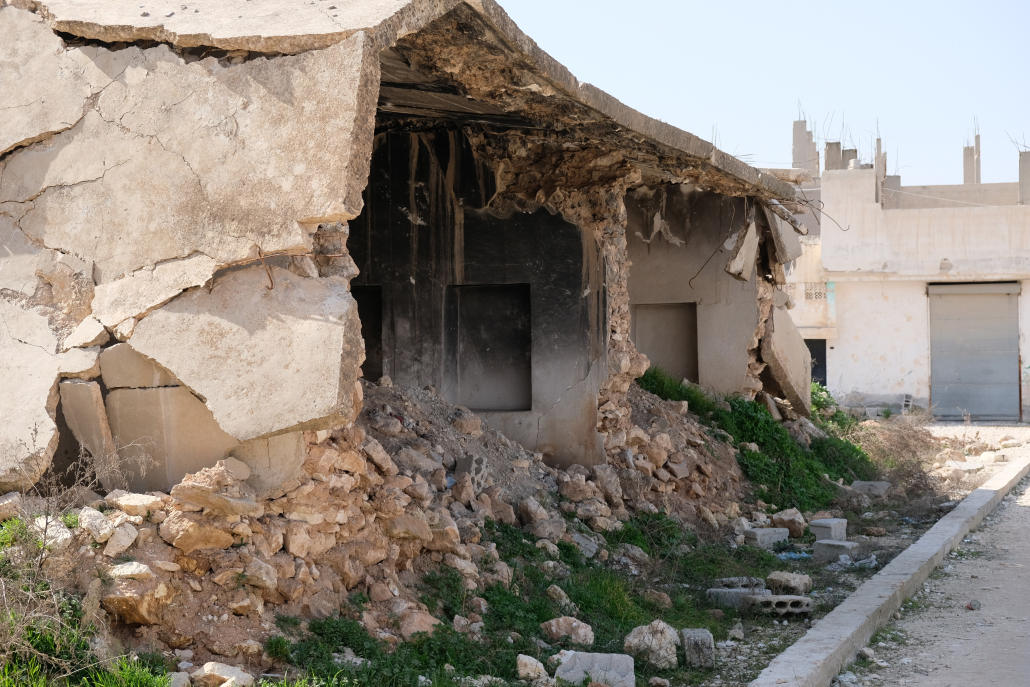
The municipal elections are coming; it is being said they will happen in April [after this interview was conducted, the DAANES announced May 30 as election date]. What is your responsibility regarding the elections?
Ferhan Haji Issa: I just want to clarify something. Yes, it may have been reported in the media that these elections would happen in April, but this is not confirmed yet. We have to consider the conditions, security and stability-wise. We have to prepare well for these elections. We are currently in March. Can we get ready in time for April? As the Executive Council, we want to ensure the elections go smoothly and democratically, but we are not directly involved. The High Electoral Commission has been formed, which will supervise the elections. They are responsible; we assist as needed.
Who is in the High Electoral Commission?
Ferhan Haji Issa: 20 people were approved for the Commission. The DAANES People’s Council chose them. They will supervise the elections and watch out for interference or shortcomings. These elections are a relatively new thing for us in NES. Therefore, a lot of work is needed to ensure they run successfully. As the Executive Council, we will help this Commission fulfil its responsibilities, but we will not meddle in their work.
There is one Commission for NES? Or each canton has its own?
Ferhan Haji Issa: There is one Commission, featuring members from each canton.
There has been one round of municipal elections previously, in 2017, right?
Rewshan Abdi: Yes. Prior to 2012, the Syrian state also had municipalities here. After the war of Kobane, we built our own municipalities, but there was no money and no system. In 2015, the municipality of Kobane properly opened, with co-chairs. The first elections were held at the end of 2017 and in 2018, the elected officials began their work. The co-chairs elected then are still in their positions now. There should be elections every two years, but it hasn’t happened that way. At that time, the municipality system was different, prior to the changes introduced in the new Social Contract. There were 11 members of each municipality, including 2 co-chairs and 2 deputies, who were elected by the District Council. With the old municipal system, there were 14 municipalities in the Euphrates Region, which was comprised of the cantons of Kobane and Gire Spi [Tel Abyad]. The new Social Contract changes this system a bit. The geographic area formerly referred to as the Euphrates Region is now called the Euphrates Canton. Across NES, all former Regions are now referred to as Cantons, and the geographic unit formerly referred to as canton has been scrapped administratively. We will also re-draw the administrative boundaries of the municipalities. As I said, the Euphrates Region had 14 municipalities – we had more but Turkey’s 2019 invasion and occupation meant we lost some. For the municipal elections, we will change this, but it is still not clear what this will look like. Maybe the number of municipalities will increase, maybe decrease. I can not say right now how many municipality co-chairs will be elected for the Euphrates Canton. There is still lots of preparatory work to do for the elections. The census hasn’t been finalized, so we haven’t clarified population numbers yet.
Do you think parties from the Kurdish National Council [KNC] will participate in the upcoming elections?
Ferhan Haji Issa: As the Executive Council of Euphrates Canton, our work is not concerned with these matters. The People’s Council deals with matters of giving permission for political parties to run in the elections. I believe their opinion would be positive for KNC parties to join. If you are a political party working in this region, you can run. But I want to say something about the situation of KNC. Their situation, and connections with the Syrian Opposition and Turkish state, leaves doubt regarding their actual love for and connection to this country. They should clarify their position. Afrin is occupied. The people of Afrin face daily abuses. There is a saying: you can’t have it both ways. They are friends of the Syrian Opposition and at the same time, they present themselves as on the side of the Kurds. This is not right. The Syrian Opposition is an organization that aids terror. This is a fact. And Turkey, who has occupied our regions… How you can join them and then come join our elections? They need to decide their stance. We don’t forbid any parties. In NES this is clear. We are open to dialogue with anyone. But we cannot tolerate duplicity. Opinions should be clear. Turkey targets and kills us with warplanes. And the KNC sits beside Turkey, eats with and takes money from them and assists them? The parties of KNC should clarify: are they people of Rojava, people of NES? Or are they siding with those who are ruining the region and the lives of its people? I believe the DAANES has a clear opinion. Anyone can participate in these elections. But I think there are conditions for this.
There has only been one round of municipal elections here in the last 10 years. How will you go about informing and educating people on the upcoming elections and how the process will work?
Rewshan Abdi: When the time is right, educational meetings will be made for people to understand the electoral system. We, as the municipality, won’t be responsible for making them. Maybe the communes will, maybe the High Electoral Commission. Also, elections are not everything for democracy. If someone is elected by 51% of the people, the 49% who voted for someone else are left with nothing. Their voice has no meaning. Their votes are gone. This is an issue. Here, we want everyone’s voice to be heard. Here, anyone can come to the municipality, talk to the co-chairs, say that someone tasked with a responsibility is not properly fulfilling their role, things like this. We have a kind of democracy where you can criticize and be listened to. People can come here and tell us everything. We are happy when people come to talk with us and criticize things.
Does the election method for the councils differ from that of the municipalities?
Mohamed Hamdan al-Mohamed: Yes. Future elections at the level of the subdistrict, city, or canton councils are run through a 60/40 system. Votes from every individual person comprise 60% of the overall vote and votes from civil society organizations are weighted at 40%. This is stipulated in the new Social Contract. The 60/40 system is to ensure representation of minorities. I am a Turkman, but I live in an area populated by Arabs and Kurds. My voice would be lost if it was purely direct voting. We need to preserve minority rights. Civil society organizations of minorities (ethnic and religious) and women hence have their votes counted to ensure fair elections.
Rewshan Abdi: At the municipality elections however, the system is 100% one-person-one-vote.
